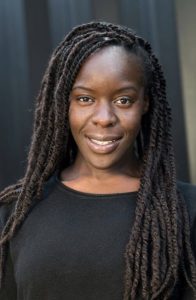Movement Director Rachael Nanyonjo talks about working on ‘Changing Destiny’ to show at the Young Vic

Courtesy of Foteini Christofilopoulou.
Seeking inspiration from the ancient Egyptian tale Sinuhe the Warrior King, celebrated writer and poet Ben Okri OBE presents Changing Destiny, an adaptation of the 4,000 year old poem. Having helped shape the show’s movement element and aesthetic, movement director Rachael Nanyonjo, whose credits include the National Theatre, BBC, Sky Arts amongst others, tells us more about what drew her to take part in the production, how she’s approached creating the show’s choreography and what she’s taken away from the process.
Hi Rachael, Ben Okri’s Changing Destiny will be showing at the Young Vic from late July. How are you feeling ahead of the run?
We have all, as a team, been working really hard to bring this story to life. Making work coming out of the pandemic is not an easy thing, however, it has allowed us to examine our practices and processes in order to work more productively. I am feeling very excited for audiences to experience what I believe is a really innovative production and piece of storytelling.
Changing Destiny is an adaptation of Sinuhe the Warrior King, a 4000 year old Egyptian poem. What inspired yourself to take part in the production?
I was inspired to work on this production because the poem is beautiful. It asks so many fundamental questions about what it is to be human in regards to fear, love, the soul, fighting against yourself and returning to yourself. I believe at times – especially in the twenty first century – we do not take enough time to interrogate these ideas honestly in our lives. So for me, I wanted to go on the journey of exploring these ideas through Sinhue’s story and finding a way to relate them to our audience.
The other reason why I wanted to work on this production is because in the UK, the lens that we view Egypt and have been presented Egyptian history particularly, has been very whitewashed. Egypt is in Africa and KwameKwei-Armah(the show’s director) told me that for this production he wanted to make sure we presented rituals, practices and aesthetics that highlighted this point. As a Ugandan British woman, this was something I was fully on board with and wanted to be a part of creating.
How have you approached creating the show’s choreography?
Kwame was really inspired by the South African production WozaAlbert. He wanted us to make a production where story telling is at the heart, almost as though it can be done around a campfire. Therefore, this was my starting point in terms of researching and dissecting the tools they used to tell this story.
For all the shows I work on, research is key. So, I read a lot about Twelfth Dynasty during the Egyptian Middle Kingdom, which is when the story of Sinuhe takes place. This helped me to understand the time, what was happening. Then I compiled images of ancient Egypt along with other images which related to the script Ben Okri wrote. This aesthetically inspired me to think about what the shape of a scene or transition or characters could look like.
I listened to music Kwame sent me and made a playlist of my own – which was a key part in my process. Finding music helps with imaging the movement world. Then it was a case of bringing my ideas and prep into the room as offers for the actors. The choreography and movement world for this piece has been based on not just what I bring into the room but what the actors do instinctively. A part of my job is to watch them and encourage ideas that they present.
What have rehearsals involved for the show?
The changing rehearsal room is very collaborative, so each week was varied. Some days we had live looping sessions with our sound designer XANA. Other days we had our lighting designer Jackie (Shemesh) in and I would lead a movement session with him there giving us lighting ideas and parameters to play within.
The basis of our rehearsals would be with Kwame, myself and the actors working through the script and developing a language for the play.
What have you learned/taken away from the process?
I would say I have learnt not to be so precious about the things I create and trust that brilliant actors will take on your offers and make them 100 times better.
What can audiences expect from the show?
History, stunning aesthetics and a great story.
What would you like for audiences to takeaway?
I hope the production asks the audience to reflect honestly on ‘Who am I in this world? And how do I want to live?’
Questions by Lucy Basaba.
Changing Destiny is currently showing at the Young Vic until Saturday 21st August 2021. To find out more about the production, visit here…


Leave a Comment